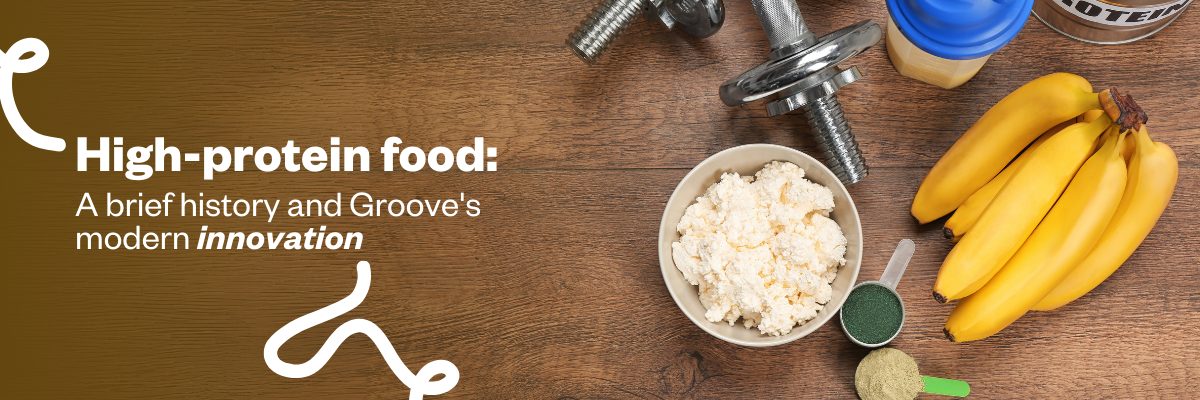High-Protein foods has long been recognized as a cornerstone of human nutrition, essential for building and repairing tissues, producing enzymes and hormones, and supporting overall health. Over the centuries, our understanding and consumption of protein have evolved significantly, influenced by cultural practices, scientific discoveries, and technological advancements.
In recent years, the demand for high-protein foods has surged. It has been driven by health trends and a growing awareness of protein’s role in wellness. Amidst this landscape, companies like Groove have emerged, offering innovative, high-protein, plant-based meals that cater to modern dietary preferences.
The Historical Journey of High-Protein Foods
Ancient Times: The Foundation of Protein Consumption
In ancient civilizations, protein sources were primarily derived from hunting and agriculture. Early humans relied on wild game, fish, legumes, and nuts to meet their protein needs. For instance, ancient Greeks consumed a diet rich in legumes and dairy, recognizing the importance of these foods in maintaining strength and vitality. Similarly, traditional Asian diets incorporated soy products like tofu and tempeh as staple protein sources.
19th Century: The Scientific Discovery of Protein
The term “protein” was coined in 1838 by Dutch chemist Gerardus Johannes Mulder. He identified it as a vital component of all living organisms. This discovery marked the beginning of scientific exploration into protein’s role in human health. By the late 19th century, the USDA recommended over 110 grams of dietary protein per day for working men, influenced by the belief that protein was the primary source of muscular energy.
20th Century: The Rise of Protein Supplements
The 20th century witnessed the commercialization of protein, especially with the advent of bodybuilding culture. In the 1950s, products like Bob Hoffman’s Hi-Proteen emerged, targeting athletes and fitness enthusiasts. The subsequent decades saw a proliferation of protein bars, shakes, and powders, making protein supplementation accessible to the general public.
21st Century: Embracing Plant-Based Proteins
In recent years, there has been a significant shift towards plant-based proteins, driven by health, environmental, and ethical considerations. Consumers are increasingly seeking protein sources that align with sustainable practices and dietary preferences. This trend has led to the development of innovative plant-based protein products that cater to a diverse range of nutritional needs.
Groove: Revolutionizing High-Protein, Plant-Based Meals
Amidst the growing demand for plant-based protein options, Groove has positioned itself as a pioneer in delivering high-protein, plant-based meals that do not compromise on taste or nutrition. Based in the UAE, we offer a range of products designed to support various lifestyles, from fitness enthusiasts to individuals seeking healthier meal alternatives.
Commitment to Quality and Nutrition
Groove’s meals are crafted using high-quality, plant-based ingredients. By combining legumes, grains, and other nutrient-dense foods, Groove ensures that each meal delivers essential amino acids necessary for muscle repair and overall health. Our offerings are not only rich in protein but also free from artificial additives, aligning with clean eating principles.
Catering to Modern Lifestyles
Understanding the fast-paced nature of contemporary life, we emphasize convenience without sacrificing nutritional value.Our ready-to-eat meals are ideal for individuals seeking quick, healthy options that support their dietary goals. Whether it’s post-workout recovery or a nutritious lunch at the office, our products are designed to fit seamlessly into daily routines.
Sustainability and Ethical Practices
Groove’s commitment extends beyond nutrition to encompass environmental and ethical considerations. By focusing on plant-based ingredients, Groove contributes to reduced greenhouse gas emissions and lower resource consumption compared to animal-based protein sources. This approach resonates with environmentally conscious consumers seeking to make responsible dietary choices.
Conclusion
The journey of high-protein foods reflects humanity’s evolving understanding of nutrition and health. From ancient diets to modern scientific advancements, protein has remained a vital component of our dietary landscape. Today, companies like Groove are at the forefront of this evolution, offering innovative, plant-based, high-protein meals that cater to contemporary needs and values. By embracing such options, individuals can enjoy the benefits of protein-rich diets while supporting sustainable and ethical food practices.


